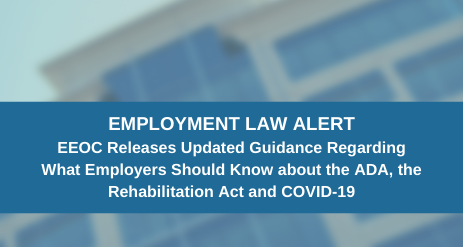
Last week, the Equal Employment Opportunity Commission (“EEOC”) released updated guidance entitled “What You Should Know About the ADA, the Rehabilitation Act, and COVID-19.” The updated guidance provides answers to employers’ frequently asked questions regarding compliance with the Americans with Disabilities Act and the Rehabilitation Act during the COVID-19 outbreak.
The following are some of the questions and answers addressed in the EEOC’s updated guidance:
Q: How much information may an employer request from an employee who calls in sick, in order to protect the rest of its workforce during the COVID-19 pandemic?
A: During a pandemic, ADA-covered employers may ask such employees if they are experiencing symptoms of the pandemic virus. For COVID-19, these include symptoms such as fever, chills, cough, shortness of breath, or sore throat. Employers must maintain all information about employee illness as a confidential medical record in compliance with the ADA.
Q: May an ADA-covered employer take the body temperature of employees during the COVID-19 pandemic?
A: Generally, measuring an employee’s body temperature is a medical examination. Because the CDC and state/local health authorities have acknowledged community spread of COVID-19 and issued attendant precautions, employers may measure employees’ body temperature. However, employers should be aware that some people with COVID-19 do not have a fever.
Q: Does the ADA allow employers to require employees to stay home if they have symptoms of the COVID-19?
A: Yes. The CDC states that employees who become ill with symptoms of COVID-19 should leave the workplace. The ADA does not interfere with this advice.
Q: When employees return to work, does the ADA allow employers to require doctors’ notes certifying their fitness for duty?
A: Yes. Such inquiries are permitted under the ADA either because they would not be disability-related or due to the pandemic, justified under the ADA standards for disability-related inquiries of employees. As a practical matter, however, doctors and other health care professionals may be too busy during and immediately after a pandemic outbreak to provide fitness-for-duty documentation. Therefore, new approaches may be necessary, such as reliance on local clinics to provide a form, a stamp, or an e-mail to certify that an individual does not have the pandemic virus.
The updated guidance also states that employers may screen applicants for COVID-19 symptoms after making a conditional offer of employment, and delay an applicant’s start date if the applicant has COVID-19 or displays symptoms of COVID-19.
While the ADA and the Rehabilitation Act continue to apply, the updated guidance specifically acknowledges that they “do not interfere with or prevent employers from following the guidelines and suggestions made by the CDC or state/local public health authorities about steps employers should take regarding COVID-19.” The EEOC further advised employers to continue following the most current information on maintaining workplace safety because the guidance from public health authorities is likely to change as the COVOD-19 pandemic evolves.
Please contact us if you have any questions regarding the EEOC’s updated guidance or would like to discuss this topic further.
The contents of this Alert are for informational purposes only and do not constitute legal advice. If you have any questions about this Alert, please contact the Shulman Rogers attorney with whom you regularly work or a member of the Shulman Rogers Employment and Labor Law Group.
Stay up to date with all the latest news and events.